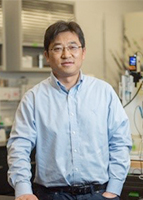Time: January 10th, 2019, 16:00 pm
Venue: 3rd Floor Conference Room, Catalysis Building
Lecturer: WU Gang, University at Buffalo

Abstract:
Development of clean and sustainable renewable energy is able to address the challenges associated with the rapidly increasing global energy demand and possible climate changes caused by carbon dioxide emission. However, people argue that we can’t effectively utilize renewable energy such as sunlight and wind due to their intermittent problems, until appropriate energy conversion and storage technologies are developed. Among available energy conversion technologies, proton exchange membrane fuel cells (PEMFCs), which directly convert chemical energy of fuels to electricity, have been widely considered a clean energy technology due to their high efficiency, high power density, environmental friendliness, and high reliability. However, several challenges must be overcome before large-scale commercialization of PEMFCs can be realized, such as high costs, insufficient durability, and hydrogen fuel related technologies. The high cost problem is due to the use of large amount of Pt catalysts for the sluggish oxygen reduction reaction (ORR) in PEMFC cathodes. It has been reported that platinum group metal (PGM) catalysts represent about 45% of the entire cost in the state-of-the-art PEMFCs. To address the cost issues of fuel cell technologies, Pt catalysts must be replaced by PGM-free catalysts derived from earth-abundant elements. Therefore, it is scientifically and technically important to develop high-performance PGM-free cathode catalysts. Compared to other studied PGM-free formulations (e.g., oxides, sulfides, or carbides), carbon-based catalysts often possess many advantages including their excellent electrical conductivity, high surface areas, low-cost, and easiness of functionality. However, proper doping with heteroatoms (e.g., N, S, P) and transition metals (e.g., Fe, Co, or Mn) to modify the electronic and geometric structures of carbon is the key to enhancing catalytic performance. Herein, we introduce a new class of atomically dispersed and nitrogen coordinated metal-based carbon catalyst through controlled chemical doping of metals ions (Fe, Co, or Mn) into zinc-rich zeolitic imidazolate framework (ZIF), a type of metal-organic framework (MOF). The novel synthetic chemistry enables accurate controls of metal doping levels, particle sizes, and nanostructures of catalysts, which allows us to establish synthesis-structure-activity correlations. The best performing catalyst with optimal morphology and structure has achieved a new performance milestone for the ORR in challenging acidic media comparable with state-of-the-art Pt/C. The high-performance atomic metal-rich catalysts hold great promise to replace Pt for future fuel cells as well as for other sustainable electrochemical energy storage and conversion applications such as CO2 reduction and NH3 electrosynthesis.
Introduction:
WU Gang is an associate professor in the Department of Chemical and Biological Engineering at the University at Buffalo (SUNY-Buffalo). He completed his Ph.D. studies at the Harbin Institute of Technology in 2004 followed by extensive postdoctoral training at Tsinghua University (2004-2006), the University of South Carolina (2006-2008), and Los Alamos National Laboratory (LANL) (2008-2010). Then, he was promoted as a staff scientist at LANL. He joined SUNY-Buffalo as a tenure-track assistant professor in 2014, and was early promoted as a tenured associate professor in 2018. His research focuses on functional materials and catalysts for electrochemical energy technologies. To date, he has published more than 190 papers with citations of > 15,000 times and H index of 60. Currently, he is leading and participating in multiple fuel cell, battery, and renewable fuel (e.g., NH3) related projects supported by U.S. DOE EERE Office, APRA-e Office, and National Science of Foundation with a total research funding of more than $4.0 M. Dr. Wu was acknowledged by Clarivate Analytics as one of 2018 Highly Cited Researchers, in recognition of exceptional research performance demonstrated by production of multiple highly cited papers that ranked in the top 1% in Web of Science.
Contact: ZHENG Min, DNL16
Phone: 84379005